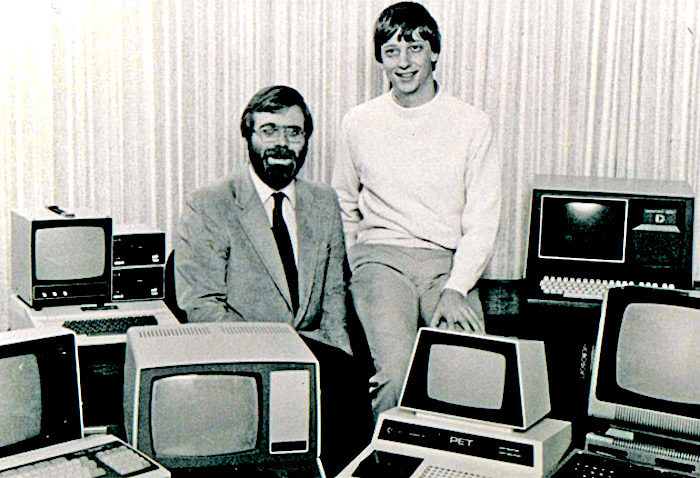Hr. Allens kommende bog afslører en dybt siddende bitterhed i hjertet af det berømte forhold, der skabte den mest succesrige softwarevirksomhed, verden nogensinde har set. I Idea Man: A Memoir hævder Allen også, at Gates aldrig gav ham nok kredit for hans bidrag til Microsofts tidligste udvikling og heller ikke en stor nok andel af virksomheden. Faktisk beskylder hr. Allen sin ven for at mobbe ham for aktier, der ville have været milliarder af dollars værd.
Hr. Gates og hr. Allen blev først venner i 1968 over deres Seattle high school Teletype-maskine, hvor de skrev deres første software sammen. Hr. Allen flyttede til Boston, og Gates frafaldt Harvard University i 1975, så de kunne arbejde på, hvad der til sidst ville blive Microsoft. Virksomheden skabte, hvad der skulle blive den allestedsnærværende driftssoftware på den personlige computer, og voksede ud til en virksomhed, der nu er værd $ 220 mia. (£ 137 mia.).
Kommentar: Delvist oversat af Sott.net fra Microsoft co-founder Paul Allen: Gates is a ruthless schemer
In excerpts published in Vanity Fair yesterday, three weeks before of the publication of Idea Man, Mr Allen says he was "taken aback" when Mr Gates suggested Microsoft should split 64 per cent in his favour, rather than 50-50. Gates won, and it's clear the wounds are still raw:
"I tried to put myself in his shoes and reconstruct his thinking, and I concluded that it was just this simple: 'What's the most I can get?'. He might have argued that the numbers reflected our contributions, but they also exposed the differences between the son of a librarian and the son of a lawyer. I'd been taught that a deal was a deal and your word was your bond. Bill was more flexible."The memoir also includes the explosive revelation that Mr Gates conspired with Microsoft's first chief executive, Steve Ballmer, to reduce his co-founder's stake even further. Mr Allen recalls overhearing a conversation between Gates and Ballmer in 1982, as he was recovering from treatment for lymphoma, when they discussed the possibility of issuing themselves new share options that would reduce Mr Allen's stake in the company.
"I helped start the company and was still an active member of management, though limited by my illness, and now my partner and my colleague were scheming to rip me off. It was mercenary opportunism, plain and simple."Mr Gates soon apologised for even discussing the idea.
The bitter tone of the book has soured relations between two men who have remained cordial and in contact ever since Mr Allen finally resigned from Microsoft in 1983, a decision he now says was driven by exhaustion at the constant fighting and disillusionment by his co-founder's tendency to demean his programmers using sarcasm.
Mr Gates strove to rise above the accusations yesterday.
"While my recollection of many of these events may differ from Paul's, I value his friendship and the important contributions he made to the world of technology and at Microsoft."Nonetheless, Mr Allen's book looks set to open up the question of how much credit each of the two school friends should get for Microsoft's early success, and on this, Idea Man makes a determined case to future historians that Mr Gates's credit should be reduced. Mr Allen says in one tart passage:
"Some said Bill's management style was a key ingredient in Microsoft's early success, but that made no sense to me. Why wouldn't it be more effective to have civil and rational discourse? Why did we need knock-down, drag-out fights?"After Microsoft: The computer geniuses who parted ways
Although their paths diverged when Paul Allen left the company in 1983, Microsoft's billionaire founders have continued to rub shoulders in the worlds of technology and philanthropy.
But while Bill Gates went on to build a monopoly in software for the personal computer, and expand into gaming and internet services, Mr Allen's ventures in software and cable television were not always so successful. Last year, his firm sued many of Silicon Valley's most famous firms, saying it has a patent on basic technology for internet search and touchscreens.
In philanthropy, the Bill and Melinda Gates Foundation, where Mr Gates now works day-to-day, immediately became one of the largest foundations in the world. Idea Man is Mr Allen's attempt also to put a spotlight on his philanthropic work, which includes funding for research into the workings of the brain. Mr Allen also owns sports teams and has funded prototypes for new types of spacecraft.




Læserkommentarer
dig vores Nyhedsbrev